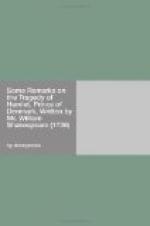Hamlet’s Letter to Ophelia, which Polonius reads, is none of the best Parts of this play, and is, I think, too Comick for this Piece. The whole Conduct of Hamlet’s Madness is, in my Opinion, too ludicrous for his Character, and for the situation his Mind was then really in. I must confess, nothing is more difficult than to draw a real Madness well, much more a feign’d one; for here the Poet in Hamlet’s Case, was to paint such a Species of Madness as should not give cause of Suspicion of the real Grief which had taken Possession of the Prince’s Mind. His Behaviour to those two Courtiers, whom the Usurper had sent to dive into his Secret, is very natural and just, because his chief Business was to baffle their Enquiries, as he does also in another Scene, (p. 304.) where his falling into a sort of a Pun upon bringing in the Pipe, is a great Fault, for it is too low and mean for Tragedy. But our Author in this (as in all his Pieces) is glad of any Opportunity of falling in with the prevailing Humour of the Times, which ran into false Wit, and a constant endeavour to produce affected Moral Sentences.
He was very capable of drawing Hamlet in Madness with much more Dignity, and without any Thing of the Comick; although it is difficult, as I said, to describe a feign’d Madness in a Tragedy, which is not to touch on the real Cause of Grief.
Page 277.
The Scene of the Players is conducive to the whole
Scheme of this
Tragedy, and is managed with great Beauty. We
are to observe, that the
Speeches spoken by the Prince, and one of the Players,
are dismal
Bombast, and intended, no doubt, to ridicule some
Tragedy of those Days.
The Poet’s stepping out of his Subject to lash the Custom of Plays being acted by the Children of the Chapel, is not allowable in Tragedy, which is never to be a Satire upon any modern particular Foible or Vice that prevails, but is to be severe upon Crimes and Immoralities of all Ages, and of all Countries.
Hamlet’s Speech, (p. 281.) after his Conversation with the Players, is good; and by it we see that the Poet himself seems sensible of the Fault in his Plot. But that avails not, unless he had found Means to help it, which certainly might have been.
The Prince’s Design of confirming by the Play, the Truth of what the Ghost told him, is certainly well imagin’d; but as the coming of these Players is supposed to be accidental, it could not be a Reason for his Delay.
ACT III.
Page 284.
How smart a Lash, that Speech doth give my Conscience, &c.
The Poet here is greatly to be commended for his Conduct. As consummate a Villain as this King of Denmark is represented to be, yet we find him stung with the deepest Remorse, upon the least Sentence that can any ways be supposed to relate to his Crime. How Instructive this is to the Audience, how much it answers the End of all publick Representations by inculcating a good Moral, I leave to the Consideration of every Reader.




